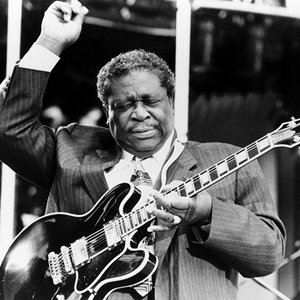MEETING POPE WAS HIGHLIGHT: B.B. KING
Gets 1st gold album in 48 years, Blues Brothers 2000 coming up
NICK KREWEN
THE HAMILTON SPECTATOR,
Wednesday, January 21, 1998
TORONTO —
The undisputed King Of The Blues calls meeting Pope John Paul II “the highlight of my life,” but says he didn’t offer him any lessons after giving him a replica of his prized guitar Lucille.
“No, I did not,” chuckled Riley “B.B.” King, who recalled his December 18 visit to the Vatican during a rare press conference yesterday afternoon as he held court prior to a concert at Toronto’s Massey Hall last night.
Known for such classics as “The Thrill Is Gone,” “Caledonia” and “Nobody Loves Me But My Mother,” the 72-year-young King said he was practically speechless during the brief meeting.
“I was so — I don’t know the word to use — but I was so excited,” said King, his eyes widening as he sat impeccably dressed in a grey suit, leaning forward on a chair cushion.
“It was the highlight of my life. I’m surprised I was able to say something. I remember saying, `Holy Father, I have a gift for you.’ And he looked at me and said `Thank you.’ I gave him the guitar and he said, `Thank you’ again. Then he said `Happy Holidays to you and your loved ones,’ and it seemed like I passed out. I don’t remember anything else.”
“I’m not Catholic, but I love it.”
Reminded that the Pope himself is a musician who has released a few albums, King was asked how he’d feel if Lucille was utilized by His Holiness for a Papal recording session.
“I just hope that he’d be pleased and get some pleasure out of just having it, “King replied. “That’s what I hope.”
King mentioned he was ribbed afterward by some of his associates who attended the event with him.
“Some of my guys were telling me that as they were leaving, they heard him play ‘The Thrill Is Gone’ in the back room. I know they were lying,” he smiled.
Meeting the Holy Father is just the latest honor in a distinguished career for the affable bluesman, a calling that includes a truckload of “Lifetime Achievement” awards, Kennedy Center Honors, a Presidential Medal Of The Arts, eight Grammies, and membership in the Blues Foundation and Rock and Roll Halls Of Fame.
Ironically, another award had eluded him for 48 years and 58 albums until he was presented it yesterday — a gold album for his latest project, Deuces Wild, a star-studded duet disc that pairs the blues master with such pop legends as Van Morrison, Eric Clapton and Bonnie Raitt as well as relative newcomers Heavy D., Tracy Chapman and Simply Red‘s Mick Hucknall.
“I can’t really believe it,” exclaimed a grateful and humbled King as he posed for cameras and photographers. “This has never happened before. I’m really honored.”
There isn’t an entertainer alive who questions the role B.B. King has played in promoting the blues to the level of mainstream attention it enjoys today. Frank Sinatra and Elvis Presley adored his music, and The Rolling Stones thought so highly of King that they hired him as the opening act of their 1969 world tour, catapulting him into rock audience sightlines and instant demand for TV appearances.
Then in 1987, Irish rockers U2 recorded “When Love Comes To Town” as a duet with King for its album and movie, Rattle And Hum — thus presenting him to a whole new generation.
Yet King stops short of calling himself a blues ambassador.
“I don’t think of myself of an ambassador,” says King, who resides in Las Vegas and averages 250 concerts a year.
Born Riley B. King in Itta Bena, Mississippi, on September 16, 1925, his parents separated when he was four, forcing B.B. to live with his grandparents in nearby Kilmichael. His mother died five years later, and B.B. ended up moving in with his father for a few years and working on a plantation near Indianola, Mississippi until he was 20.
“I was a superstar of the tractor,” he says proudly of the old days.
In 1946, he decided music was his future and headed to Memphis, tracking down cousin and renowned bluesman Bukka White. In 1948, King was hired by Memphis blues station WDIA for a 15-minute live radio spot where he performed and hawked a health tonic called Pep-Ti-Kon.
He recorded a couple of sides for Bullet Records a year later, switched to Sam Phillips‘ RPM label in 1950-51, and recorded “Three O’ Clock Blues” at the black YMCA as his first #1 R&B hit. By 1955, King forfeited his job at WDIA and hit the road as a full-time entertainer.
King’s next round of mass exposure comes with the February release of the movie Blues Brothers 2000. He has a small speaking role as a used car dealer and fronts a band that includes Eric Clapton, Bo Diddley and Travis Tritt, but says he’d like a bigger role.
“I would like to have something in the future that goes just a little longer, a few more lines,” he says with a twinkle in his eye. “I think I did pretty well with the ones I had. I didn’t forget them.”


Be the first to comment on "Meeting Pope Was Highlight: B.B. King"